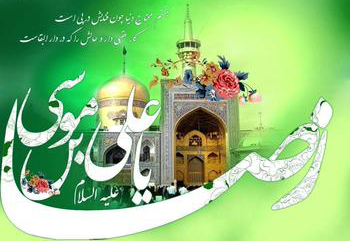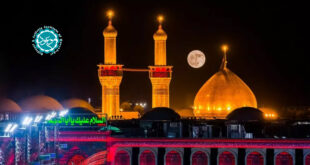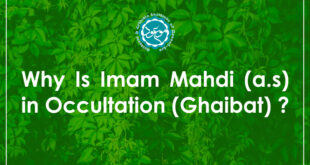Swiftness of Response
Emam al-Rida (A.S.) was endowed with a readiness to respond coupled with the strength of argument and oratory to which extra-ordinary expressions freely submitted without making the over-all meaning too difficult to comprehend. His arguments with the heads of other religions, with foremost writers, and with atheists in which he outwitted them with his clear argument and decisive arguments, all provide us with a glorious indication that he used to enjoy the ability to provide a ready answer and a speed in intellectual reasoning.
This is why learned scholars held him in high esteem and hesitated to challenge him to debate in any field of knowledge as actually happened after his arguments with the highest authorities of other religions at a meeting al-Mamoon arranged at his court and the audience were tongue-tied when he challenged them to put for discussion whatever came to their minds.
His Patience and Perseverance
The patience and perseverance of the Emam manifest themselves clearly when he had to face psychological and emotional crises. When he went to say his farewell at the Ka’ba, Mecca, upon being ordered by al-Mamoon to be present at his court in Khurasan, he was faced with an emotional situation involving his only son Abu Ja’fer Muhammad ibn Ali al-Jawad, but he maintained with an iron will his self-control, solacing himself with a patient heart, submitting to God’s Will and Decree.
Umayya ibn Ali states: “I was sitting with Abul-Hassan (A.S.) at Mecca during the year in which he performed the hajj prior to his trip to Khurasan, and Abu Ja’fer was with him when he was bidding the House (Ka’ba) good-bye. Having finished his tawaf, he went to the maqam and said his prayers there. Abu Ja’fer, accompanied by Muaffaq, was making his tawaf, till he reached the Stone. There he sat and he prolonged his sitting there. Muaffaq said to him: `May my life be sacrificed for yours! It is time you stood up.’ He answered: `I do not wish to leave this place at all except by the Will of God,’ and grief could easily be seen clouding over his face. Muaffaq approached Abul-Hassan and said to him: `May my life be sacrificed for yours! Abu Ja’fer is sitting by the Stone unwilling to leave,’ so Abul-Hassan stood up, came to Abu Ja’fer and said: `Stand up, my loved one.’ But his son said: `I do not wish to leave this place…’ He said: `Do stand up, O my loved one.’ After a while, he said to his father: `How can I stand up seeing that you have already said your farewell at the House never to return again?’ He said: `Do stand up, my loved one.’ He stood up and left with his father.”
The Emam (A.S.) patiently put up with numerous norms of persecution and injustice inflicted upon him during the reign of (Harun) al-Rashid starting with the tragedy of his father, passing by the tragedies to which the Alawides were subjected, and ending with the unfair instigations to al-Rashid by the Emam’s opponents to kill him and eliminate him. The strength of the patience and perseverance of the Emam become manifest when we examine the thinly veiled political persecution from which he suffered during al-Mamoon’s reign especially after the latter appointed him as his heir to the throne, fully knowing that al-Mamoon was not sincere in his intention but rather enacted a political act in which al-Mamoon played the major role solely to provide security to the shaky foundations of his regime due to the storming events the outcome of which was reflected upon the issue of who would succeed him on the throne.
The extent of the suffering of the Emam, the degree of his bitterness and agony, and the amount of grief and sorrow which filled his heart due to the treatment meted to him by the government, can be assessed; yet he buried all of that in the depth of his mind with mute patience and perseverance. Yasir, his servant, said once: “Whenever al-Rida (A.S.) returned home on Friday from the mosque, with his face sweating and stained by blowing dust, he would raise his hands and invoke God saying, `God! If the only way I am relieved from my distress is by death, then I invoke Thee to hasten its hour.'”
Suffices to assess the extent of his patience and perseverance to simply be aware of the fact that although he was God’s Argument over His creation, he was powerless to do anything while seeing right being abandoned and wrong upheld.
Generosity
In a dialogue with al-Bazanti, the Emam said: “Anyone who receives a boon is in danger: He has to carry out God’s commandments in its regard. By God! Whenever God blesses me with something, I continue to be in extreme apprehension till (and here he made a motion with his hand) I take out some of it and spend it in the way God has ordained in its regard.” Al-Bazanti asked him: “May my life be sacrificed for yours! You, in your status of high esteem, fear that much?” He answered: “Yes, indeed! And I praise my Creator for the blessings He bestowed upon me.”42
The Emam’s generosity and thoughtfulness emanate out of this good aspect of his conviction which depends on the principle of letting others share in the wealth with which God blesses him, and in what blessings and favours He bestows upon him. God’s rights in this context are the shares of the needy and the poor in this world whose ability to earn a decent living was hampered by either severe employment conditions, or disability to work due to old age, or because of being left stranded away from their original home, in addition to others who were forced by the necessities of life to stretch their hands to others for help. To ask others is humiliating, for it shatters the dignity of the person who is stretching his hand asking and by his psychological appeal to the breath of humanity in the person he is asking. In this story, the Emam guides us to realize a magnificent fact about the human psychology, that is, to give is not a favour someone does to someone else begging him for help; rather, it is his way of thanking God for the blessings with which He blessed him. The person who is blessed is in danger until he takes out of it the rights in it which are God’s.
The Emam’s method in giving is derived from such an angle of the human nature. Eleisha ibn Hamza says: “I was once talking to al-Rida (A.S.) when a large crowd of people assembled to ask him about what is permissible in Islam and what is not. A man as tall as Adam came to him and said: `Assalamo Alaikom, O Son of the Messenger of God! I am a man who loves you, your fathers and grandfathers, and I have just been on my way to perform the pilgrimage when I discovered that I had lost everything with me and now I do not have anything enough even for a leg of the trip.
If you will, please help me with the expense of going back home, and I am a recipient of God’s blessing (i.e. well to do). As soon as I reach there, I will give to the poor as much as you will give me, for I do not qualify to be a recipient of alms.’ He said to him: `Sit, may God be merciful to you,’ then he kept talking to people till they dispersed except that man, Sulaiman al-Ja’feri, Khuthai’ama and myself.
 Mouood Mouood English Edition
Mouood Mouood English Edition




